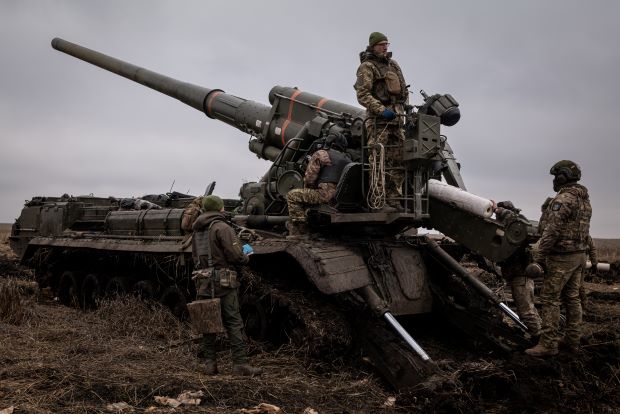From pistols to tanks: how the West armed Ukraine

By Jean-Philippe Chognot
PARIS – Since Russia invaded Ukraine a year ago, the West has delivered ever more powerful weapons to Kyiv, evolving in line with the situation on the battlefield.
Here is how the weapon supplies have developed:
– Invasion: defensive weapons –
No sooner had Russian President Vladimir Putin ordered the invasion of Ukraine on February 24, 2022 than the West started arms deliveries to its ally.
Between February and March, Ukraine received more than 40,000 small arms and light weapons (pistols, rifles, submachine guns), 17,000 shoulder-launched anti-aircraft missiles (Manpads), as well as 25,000 helmets and 30,000 bulletproof vests, according to Germany’s Kiel Institute, which tracks weapons promised and delivered to Ukraine.
Greece, for example, sent 20,000 AK-47 rifles, the United States 6,000 Manpads, 5,000 Colt M4 rifles and 2,000 Javelin portable anti-tank missiles.
Sweden for its part contributed 10,000 Manpads, the Czech Republic 5,000 of its Vz58 assault rifles and 3,200 of its Vz59 machine guns.
These weapons and equipment are easy to ship, receive and deploy in an emergency.
– Donbas: howitzers and rocket launchers –
After Ukrainian troops put up fierce resistance in Kyiv and the second city Kharkiv, the Russian army backed off in late March to focus on the east and south.
With a major battle looming for the eastern Donbas region, the West began delivering artillery pieces, including howitzers and rocket launchers that could hit behind enemy lines, destroying ammunition stocks and disrupting Russian supply lines.
By the autumn, 321 howitzers had been delivered, including 18 French Caesars, along with 120 infantry vehicles, 49 multiple rocket launchers, 24 attack helicopters, more than 1,000 US drones and 280 Soviet-built tanks, sent mainly by Ukraine’s neighbour Poland.
– Air strikes: surface-to-air missiles –
Despite its retreat to the east and south, Russia continued to pound cities across the country with missiles and, later, explosive drones, in a bid to wipe out Ukraine’s energy infrastructure and destroy morale.
Kyiv asked for missile defence systems to counter the threat. The United States provided eight, the United Kingdom six, Spain four and Germany one.
In December, Washington agreed to deliver its Patriot missiles, considered one of the best air defence systems in the world.
– Trench warfare: modern tanks –
Over the past few months, the war in Ukraine has descended into a war of attrition in the trenches in the east.
Russian forces have ramped up their offensive on the Donetsk town of Bakhmut, at the centre of the longest and bloodiest battle of the war.
Ukrainian President Volodymyr Zelenskyy’s appeals to the West to send state-of-the-art tanks so that Kyiv can go on the offensive again were finally heard in January.
The United Kingdom was first off the mark, promising 14 of its Challenger 2 battle tanks.
After strenuous lobbying by Zelenskyy, Germany later agreed to provide 14 of its Leopard tanks, considered among the best in the world, and gave the green light for other countries to also redeploy some of their stocks of Leopards.
Germany has also pledged at least 100 older Leopard 1 tanks while the United States said it would send 31 of its Abrams tanks.
It could be a game changer for Ukraine, which up to now relied on ageing Soviet models.
But the arms race may not end there. Poland has said it would be ready to supply Ukraine with F-16 fighter jets, if NATO members were in agreement.
– Agence France-Presse


Comments are closed, but trackbacks and pingbacks are open.